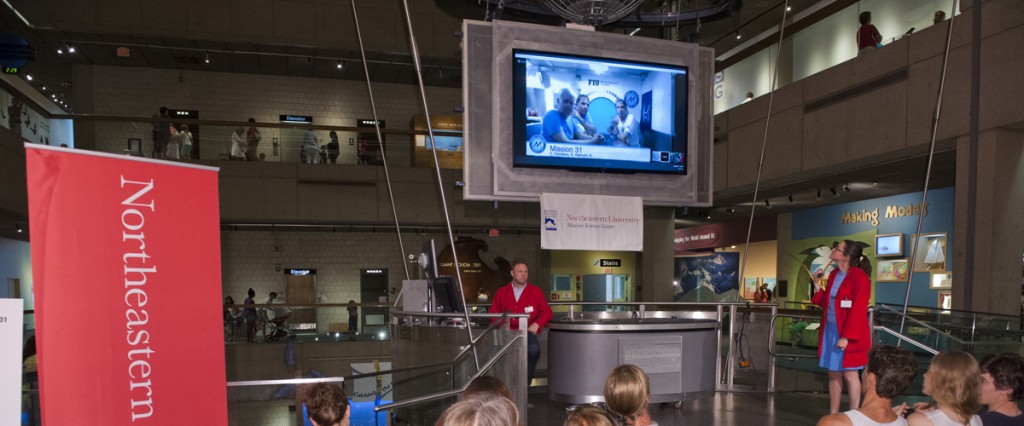by Angela Herring
“How many fish have you seen so far?”
This question came from a young girl in a colorful shirt at the Boston Museum of Science on Thursday. She stood in front of a packed audience, but the person she was talking to sat 1,400 miles away and more than 60 feet beneath the sea.
While her interlocutor, Fabien Cousteau, didn’t have a precise number for her, he did have a pretty good answer: “It’s a fireworks display of life down here,” he said, estimating that he has observed hundreds of species and tens of thousands of individual fish in the 25 days he’d so far spent living underwater off the coast of Miami at the Aquarius Reef Base, the world’s last operating underwater research base.
The event was the second in a series of four in which Cousteau and a team of Northeastern scientists held live conversations with audience members in Boston. Each event also features in-person presentations highlighting the various research projects taking place during the mission as well as hands-on exhibits such as live marine touch pools and zooplankton viewing stations.
The event series is one of several outreach programs associated with Mission 31, a monthlong underwater research expedition led by Cousteau, grandson of the legendary ocean explorer Jacques Yves Cousteau who created the first ocean floor habitats for humans.
This day was particularly special because Stephen W. Director, Northeastern’s provost and senior vice president for academic affairs, also joined in on the fun. Director, an avid diver and underwater photographer, made the 45-minute journey from the seashore to Aquarius to see the action with his own eyes.
Brian Helmuth, a professor with joint appointments in the Department of Marine and Environmental Science and the School of Public Policy and Urban Affairs, also participated in the conversation from the bottom of the sea floor while Northeastern dive instructor and mission aquanaut Liz Bentley Magee provided an up-close perspective of Conch Reef through her in-helmet camera as she swam around outside the habitat.
Helmuth noted that while the 31-day mission is enabling some very high-level research with meaningful consequences for urban coastal sustainability, the team is also having a lot of fun along the way. He is part of the surface team, which means he makes about three 45-minute dives a day to Aquarius, while the aquanauts live there full time. This allows the aquanauts’ bodies to saturate with nitrogen and eliminates the need for the between-dive decompression phases required of surface divers. The added time underwater will allow the research team accomplish nearly 10 times as much data collection than otherwise possible.
“It’s also important to demonstrate how interdisciplinary this is,” Director said. “It’s not just biologists, it’s not just engineers, it’s not just scientists. It really is a combination of people, because solving these real world problems requires an interdisciplinary approach.”
The mission’s interdisciplinary nature—a hallmark of Northeastern’s emphasis on use-inspired research—also took the spotlight earlier in the day during a series of demonstrations and discussions back at the Boston Museum of Science. Loretta Fernandez, an assistant professor with joint appointments in the College of Engineering and the College of Science, described her work measuring levels of oil contamination on Conch Reef where Aquarius is stationed. She spoke after Dan Distel, director of the Ocean Genome Legacy, who introduced attendees and the museum community to the world’s largest repository of marine genetic information, which lives at Northeastern’s Marine Science Center in Nahant, Massachusetts. Isaac Westfield, a geologist and coral scientist based in assistant professor Justin Ries’ lab, discussed the coral research that professor Mark Patterson and his team are doing at Aquarius and provided an introduction to the entire Mission 31 project.
“The oceans are the most biologically diverse ecosystem on the planet,” Westfield said. “So it’s very important that we save these sorts of environments or we lose a lot of the animals that live there too.” The goal of Mission 31, he explained, is to raise awareness of this incredibly important but increasingly threatened global resource.

